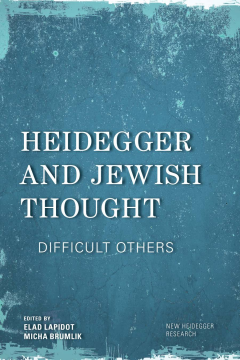
Additional Information
Book Details
Abstract
Once a prophet of critical, “other” thought, Heidegger has now for many become the epitome of the unthinkable, in the light of the Black Notebooks controversy. The unthinkable here is anti-Semitism. The encounter between Heidegger and the Jews has thus come to signify – very much in the spirit of Heidegger’s own anti-Judaism – the end of thought. The present volume resists this view by positing not only Heidegger but also the Jewish people as representing thought. The encounter between Heidegger and various traditions of Jewish thought is conceived here as a conversation inter alia, an exchange between real or perceived “others”: others to the philosophical tradition, to mainstream modernity, to Western Christian metaphysics, to each other, and even to themselves. The conversation takes shape in this volume as a symposium of seventeen essays by leading scholars both of Heidegger’s philosophy and of Jewish Studies.
a creative and useful addition to conversation on the relation between Heidegger’s legacy and Judaism.
“Difficult otherness” is how Elad Lapidot names and frames the chasm, the aggrieved juxtaposition of these two names, markers of traditions, and “figures of thought”: Heidegger, the Jews. The expert scholars here assembled have collectively taken on the arduous and audacious task of looking into the abyss, this difficult alterity, reading and measuring it, exploring it, contesting or even bridging it. A remarkable and indispensable achievement.
Gil Anidjar, Professor in the Departments of Religion, the Department of Middle Eastern, South Asian, and African Studies (MESAAS), and the Institute for Comparative Literature and Society (ICLS), Columbia University
Micha Brumlik is professor emeritus at the Goethe University of Frankfurt am Main and senior professor at the Center for Jewish Studies Berlin-Brandenburg.
Elad Lapidot is a lecturer and researcher at the Freie Universitat Berlin and the Center for Jewish Studies Berlin-Brandenburg. He is the author of Etre sans mot dire (2010).
. . . . this volume as a whole lives up to its own standard of being an “intervention” in the spirit of polemos. By assembling a wide array of approaches, it inter-venes in the most literal sense: It comes between dominant discursive positions that, while masquerading as neutral analyses of the ideological implications of Heidegger’s thinking, too often are deeply factional in character. Without attempting to mediate between or reconcile said positions, let alone Heidegger and the Jewish intellectual tradition, it attests to the possibility of productive dialogical dispute between modes of thought generally deemed incompatible. In doing so, it opens up the space for alternative ways of accessing the complex relation between these modes that go beyond collecting evidence for or against Heidegger’s anti-Semitism.
Table of Contents
| Section Title | Page | Action | Price |
|---|---|---|---|
| Heidegger and Jewish Thought | Cover | ||
| Contents | v | ||
| Acknowledgments | vii | ||
| Introduction | 1 | ||
| Part I: Heidegger Thinks the Jews | 13 | ||
| 1 Beyond Apocalyptic Logos | 15 | ||
| 2 Heidegger and Marx: A Phantasmatic Dialectic | 33 | ||
| 3 Everyday Life, Hatred of Jews, and the Identitarian Movement: The Present-Day Heritage of Martin Heidegger | 41 | ||
| 4 “Whitewashed with Moralism”: On Heidegger’s Anti-Americanism and Anti-Semitism | 55 | ||
| 5 Being and the Jew: Between Heidegger and Levinas | 75 | ||
| Part II: Heidegger and Jewish Thinkers | 87 | ||
| 6 Den Anderen Denken—Being, Time, and the Other in Emmanuel Levinas and Martin Heidegger | 89 | ||
| 7 Groundlessness and Worldlessness: Heidegger’s Anti-Semitism and Jewish Thought | 109 | ||
| 8 Heidegger’s Judenfrage | 135 | ||
| 9 Heidegger as a Secularized Kierkegaard: Martin Buber and Hugo Bergmann Read Sein und Zeit | 155 | ||
| Part III: Heidegger and Jewish Thought | 175 | ||
| 10 Heidegger’s Seyn/Nichts and the Kabbalistic Ein Sof: A Study in Comparative Metaontology | 177 | ||
| 11 Fruits of Forgetfulness: Politics and Nationalism in the Philosophies of Martin Buber and Martin Heidegger | 201 | ||
| 12 How Else Can One Think Earth? The Talmuds and Pre-Socratics | 221 | ||
| 13 Of Dwelling Prophetically: On Heidegger and Jewish Political Theology | 245 | ||
| 14 People of Knowers: On the Political Epistemology of Heidegger and R. Chaim of Volozhin | 269 | ||
| Bibliography | 291 | ||
| Index | 303 | ||
| About the Contributors | 309 |
